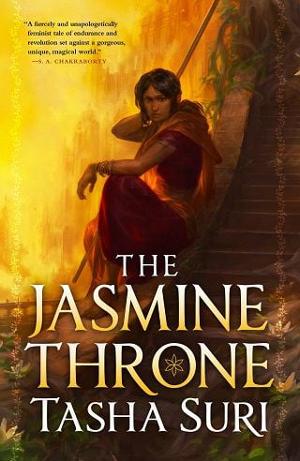Chapter 36: Bhumika
BHUMIKA
She returned to her body with a ragged groan.
Ashok. Damn him. She felt as if the poison of his rage were swimming in her own skull. She rose up from the ground, her maids fussing about her, and said, “I need to see my husband.”
“Shall I fetch the physician?” a maid asked.
“The physician? No. Fetch my husband. Him alone.”
She settled on a floor cushion. Accepted a glass of something sweet and cool, drinking it swiftly to settle the shiver of her limbs. Vikram entered, walking slowly still as a result of his wound, followed by his closest guards. He’d been at some kind of meeting, she guessed, from the tired look of his eyes. She’d seen that expression before.
“Is the child unwell?” Vikram asked abruptly, looking her over with concern. She rose to her feet, shaking her head.
“I’m well,” she said. “And so are they, I expect.”
“Then why am I here, Bhumika?”
“I asked to see you alone,” she said, glancing briefly at the commander, who was staring straight ahead, his eyes fixed on nothing in the distance.
“Leave us, Jeevan,” Vikram said shortly, and the commander bowed his head once in acknowledgment and departed.
“Well?” Vikram’s voice was edged in impatience, his attention already wandering, now that he knew there was no immediate danger to her health.
“I have news,” said Bhumika. “A terrible warning. I cannot keep it from you any longer.”
His face was like stone. “Speak,” he said.
Here, she hesitated, then said, “My family are old and venerable, Vikram. And I am… approachable. Sometimes people feel more—comfortable—speaking to me, than they would perhaps feel speaking to you. And I have heard whispers about the rebels. I believe we’re in great danger. The city is in danger. The mahal must be protected, and the people must be drawn into its walls.”
“Tell me who has spoken to you,” he said. “Ahiranyi highborn, is it? Gossiping maids? A guard or a merchant?”
“I would rather not say.”
“Bhumika. I need names. Now.”
“If someone approaches a woman of position with a warning, and asks not to be named,” Bhumika said carefully, “then revealing their name would ensure that that woman would never be warned again.”
“No one should have approached you at all,” he said, the stony look on his face now lending his voice a leaden quality. “You are my wife. I am the regent. They should have approached me.”
“I have told you nothing untrue,” said Bhumika quietly. “I am sorry I am the source of this. But I am your wife. I would not lie to you about this.”
“Anyone with knowledge worth having could have spoken to any of my advisors,” he said, with a belittling gentleness. “Or my guards. My men. Not you. You have been given baseless, poisonous gossip, Bhumika, nothing more. They should not have approached you in your fragile condition.”
It hovered on her tongue, the full truth.
There were so many times she had wanted to be honest with him. There were so many times she’d almost told him what she was.
There was an illusion that had fallen over her when she’d wed him. It did not always hold her. But sometimes the veil of it covered her eyes. Sometimes she believed she loved him. Sometimes she was grateful to him, for the fine mahal, for the opportunity to keep a handful of people safe.
Oh, she was careful to sweep it away, to remember the bare bones of the business at hand. She’d married the regent of Ahiranya. She’d married the man who’d instigated the murder of her siblings and would have seen her burn too, if she’d not had a blood family who loved her too well to truly let her go, and the political clout to erase her past and save her. But live with a person long enough, lie in their bed, no matter the politics of it, and you will feel something. Such things were inevitable.
But now it was not love that tugged the truth to her tongue. It was furious spite that made her want to speak.
He thought so little of her. So little.
You know so little, husband. My temple brother has been biding his time, building his strength, waiting until he could take the powers of the deathless waters before murdering you and every Parijati in this country. And now my fool sister has found the way to the waters, and has taken their power herself, instead of giving it to him. So if you want your rule to survive, Vikram—if you want to save Ahiranya from the promise of blood—you will listen to me. You will listen.
No. She couldn’t tell him that. But there was venom in her, regardless, when she said, “When the rebels claw this city apart—when our home and those dependent upon us burn—will you remember my warnings? You will regret not listening to me, Vikram, simply because I am merely your wife. If you cannot trust me, why did you marry me?”
She’d said too much. She knew it, looking into his face.
“You speak out of turn,” he said. “It is not your place to direct me. It is not even your place to counsel me.” His face tightened; she saw him wrestling with his own spite, resisting. Then, giving in, and saying, “If I had wanted a wise and clever wife, I would have married a woman of Parijat.”
“You gained the loyalty of the Ahiranyi highborn because you married me, a Sonali woman,” she said, not without pride and certainly not without anger. “That is worth something, I know. After you killed the temple children they would sooner have spat on your shadow. And what highborn Parijati woman would have had you, a man only regent by merit instead of the shallow business of blood?”
He was before her then. His hands on her upper arms. It took a moment for the pain to register—for her to feel the bite of his fingers, the casual, unknowing strength of them, grinding the meat of her arms, her bones.
“Enough.”He shook her—just a little, as if she were an animal to be bidden quiet, and her teeth rattled, and her insides curdled from it. “Names, Bhumika, or nothing at all.”
She did not bare her teeth at him. She did not set her own hands neatly around his throat. She lowered her eyes. Names or silence? Well, then she would have to give him silence.
Her sudden demureness must have given him pause. She felt his grip loosen a little. Raising her gaze, she saw him glance at the curve of her belly.
“I will call for the physician,” he said, and in that she heard a wealth of things: his fear that he had, perhaps, hurt her and by extension hurt the child within her. The belief that all she’d said was a product of her flesh—her pregnancy, her so-called womanly weakness of heart and body—and not evidence of her intelligence, her political acumen, and all that she was.
“No more of this.” He placed his hand upon her stomach; a warm, proprietary hand. “This is all that matters, Bhumika. Focus upon it.”
A child should not be a chain, used to yoke a woman like cattle to a role, a purpose, a life she would not have chosen for herself. And yet she felt then, with an aching resentment, how Vikram would use their child to reduce and erase her. She hated him for that, for stealing the quiet and strange intimacy of her and her own flesh and blood and making it a weapon.
“I will,” she said placidly. “I’m sorry.”
Her arms ached. She could not rely on Vikram. Could not even use him. She would have to fight Ashok herself. So be it.
 Fullepub
Fullepub 



